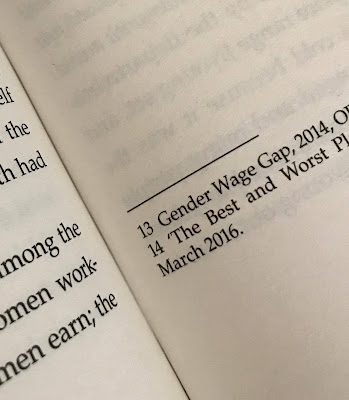I am not a feminist. If I am asked to choose between a male and female to be a leader, given their level of education and integrity to be almost similar, I may have the tendency to choose the male. But, I hate it when simple tasks such as washing the dishes become the immediate responsibility of daughters, female siblings, mothers, wives, daughter in laws or female colleagues. Everyone is capable of doing it but why some people like to label the task to be done by “female only”?
I love that this book includes footnotes to make known to readers that gender inequality in Korea is a real thing rather than the author’s own assumption. One of the most interesting findings mentioned in this book:
... a stay-at-home mother with a baby under the age of two has four hours and ten minutes a day to herself, and a mother who sends her baby to daycare has four hours and twenty-five minutes, which makes only a fifteen-minute difference between those two groups. This means mothers can’t rest even when they send their baby to daycare. The only difference is whether they do the housework with their baby beside them or without.
... a stay-at-home mother with a baby under the age of two has four hours and ten minutes a day to herself, and a mother who sends her baby to daycare has four hours and twenty-five minutes, which makes only a fifteen-minute difference between those two groups. This means mothers can’t rest even when they send their baby to daycare. The only difference is whether they do the housework with their baby beside them or without.
The author looks alike to my favourite Korean actress, Gong Hyo-jin🙈
Although the book and its movie counterpart are quite different, I don’t find their differences to be too unpleasant. Will definitely read/watch them again.
Although the book and its movie counterpart are quite different, I don’t find their differences to be too unpleasant. Will definitely read/watch them again.
Some of the footnotes which can be be found in the book




Comments
Post a Comment